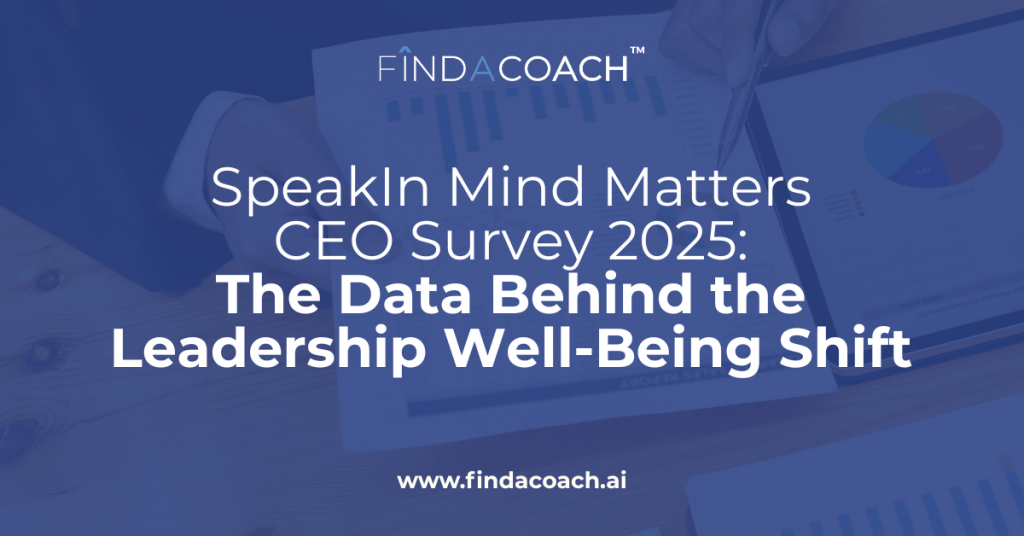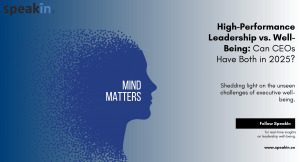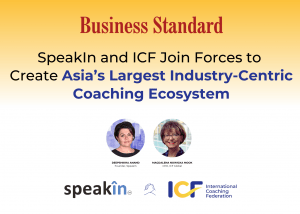SpeakIn Mind Matters CEO Survey 2025: The Data Behind the Leadership Well-Being Shift
SpeakIn’s 2025 CEO Survey reveals a growing leadership well-being crisis. With input from 100+ CEOs, the report highlights the urgent need for structured resilience support, governance integration, and cultural change to help leaders thrive amid increasing stress, isolation, and complexity.

In today’s fast-paced and unpredictable corporate landscape, leadership resilience has become a critical determinant of long-term organizational success. As CEOs navigate increasingly complex challenges—from market instability to workforce engagement—there is growing recognition of the toll these pressures can take on their mental well-being. This realization is driving a significant shift in leadership culture, focusing not only on business outcomes but also on the health and resilience of leaders themselves. SpeakIn’s 2025 CEO Mental Health & Leadership Resilience Survey, an industry-first report with input from 102 CEOs, sheds light on the mounting stressors executives face and emphasizes the urgency of prioritizing leadership well-being.
The Growing Stressors for CEOs
The survey identified several primary sources of stress that are weighing heavily on the shoulders of CEOs. Among the most significant were crisis management and employee management. Given the global uncertainties, CEOs are finding themselves managing crisis after crisis, from economic instability to supply chain disruptions. As 2025 approaches, global events and shifting market dynamics continue to add unpredictable challenges to their daily operations.
Another major concern is employee management—particularly talent retention and workplace culture shifts. As the world of work evolves, 72% of CEOs ranked workforce engagement and retention as top priorities, recognizing that the foundation of any thriving company lies in its people. This is no surprise, given that people are at the heart of organizational success. CEOs are feeling the pressure to create a culture where employees feel valued and motivated, especially in the face of growing competition for top talent.
In addition to people and crisis management, financial pressures also topped the list. Balancing short-term growth with long-term strategic goals has become a constant struggle. Decision fatigue is a real challenge as CEOs weigh competing priorities, trying to ensure their company stays afloat today while preparing for success tomorrow.
The Isolation Trap
A particularly concerning finding from the survey was the growing isolation many CEOs feel. The survey revealed that CEOs who operate in isolation are 35% more likely to experience decision fatigue, which in turn leads to a 14% increase in leadership turnover. It’s easy to see how this isolation can negatively impact decision-making. Without structured peer support, many leaders are forced to make critical decisions in a vacuum, adding even more stress to an already overwhelming role.
This sense of isolation extends beyond just the executive office. It highlights the larger issue that leadership well-being is not just a personal issue—it’s a business imperative. The emotional and mental well-being of CEOs has a direct impact on organizational health, from market capitalization to employee morale. Companies that fail to provide adequate support structures for their top leaders may face severe consequences in the form of burnout, poor decisions, and even market decline.
The Ripple Effect: Consequences for the Organization
The impact of neglecting CEO well-being goes far beyond just the individual. CEOs who experience high levels of stress contribute to over $14 billion in annual turnover costs for Fortune 500 companies. The strain on a CEO’s mental health doesn’t just affect them; it trickles down to the entire organization. Burned-out leaders often prioritize short-term gains over long-term strategies, which can stunt innovation and diminish the overall growth potential of the business.
In fact, companies with high-stress leadership allocate 12% less to research and development, the lifeblood of future innovation. Furthermore, employee turnover increases by 20%, which further diminishes productivity and increases operational costs. The message is clear: neglecting CEO well-being ultimately damages the company’s long-term financial health.
The Current State of CEO Stress: Alarming Statistics
The statistics around CEO stress are striking. According to the survey, 18% of CEOs are facing extreme stress, particularly in high-growth industries. More than 50% of CEOs experience mental exhaustion multiple times a week. Perhaps most concerning of all, 67% of CEOs report sleeping less than six hours a night, severely impairing their decision-making abilities. Despite these alarming numbers, only 19% of CEOs actively seek professional support, often due to the fear of negative perceptions or stigmas surrounding mental health.
The lack of mental health support is not just an issue for individual leaders; it’s a systemic challenge that is now being recognized as a major governance issue. While 68% of CEOs report that people management and leadership challenges contribute to their stress, another 63% cite financial pressures as major stressors. The culmination of these challenges leads to what many CEOs describe as a feeling of burnout and being perpetually on edge. As one respondent in the survey put it, “It’s as if I’m juggling too many balls in the air, and at any moment, something will crash down.”
Addressing the Crisis: A Call for Structured Support
The data suggests that if CEOs are to continue leading effectively, they need more than just personal coping strategies—they need structural support from their boards and organizations. One of the survey’s key recommendations is the integration of structured resilience programs, supported by proactive board intervention. In fact, 42% of CEOs emphasized the need for structured development programs to help build resilience. 33% called for mental health support, while 25% highlighted the importance of mentorship and coaching.
But there’s also a deeper recognition that leadership resilience cannot be cultivated overnight. It must be built into the organization’s culture and governance structure. This is where the concept of the Unified CEO Resilience Framework comes in.
Institutionalizing Leadership Well-Being
The survey findings clearly indicate that CEO well-being must be prioritized and institutionalized within the corporate governance structure. The adoption of a Unified CEO Resilience Framework can be a game-changer, ensuring that CEOs receive the support they need to perform effectively. This framework integrates board governance, leadership development, and organizational strategy into a cohesive approach for building and maintaining resilient, high-performance leadership.
Key components of this framework include:
- Board-Level Integration & Governance: The well-being of the CEO should be embedded within board evaluations and governance models. Regular health assessments and well-being metrics can help track the mental and emotional state of CEOs, ensuring they receive the support they need.
- Structured Peer Support: Establishing confidential peer advisory groups and providing executive coaching should be mandatory. Peer networks offer a crucial source of emotional support and insight, helping CEOs share experiences and strategies for managing stress.
- Compensation Alignment: A CEO’s resilience and mental fitness should be directly linked to their compensation packages. Shifting away from traditional short-term financial KPIs to include long-term resilience goals can incentivize CEOs to prioritize their well-being.
- Mandatory Recovery Periods: Introducing sabbaticals and recovery breaks in line with business cycles can ensure that CEOs are given the time and space needed for strategic reflection and cognitive renewal.
- Evidence-Based Resilience Training: CEOs should have access to tailored resilience training programs, including mental health support, stress mitigation techniques, and cognitive optimization strategies.
SpeakIn’s Role in Supporting CEO Resilience
SpeakIn recognizes the urgency of supporting CEO resilience and offers solutions that can help organizations integrate well-being frameworks into their leadership strategies. Two key tools offered by SpeakIn—Leadership quotient and FindACoach—are designed to address the critical need for leadership assessment and personalized coaching.
- Leadership quotient: This assessment tool evaluates key leadership attributes such as decision-making style, adaptability, emotional intelligence, and communication skills. By using this tool, organizations can gain insights into the current leadership capabilities of their CEOs and identify areas that require attention before issues escalate.
- FindACoach: After completing the assessment, CEOs can benefit from personalized coaching through the FindACoach platform. This service connects executives with experienced mentors who can provide guidance on improving resilience, managing stress, and navigating complex organizational challenges.
These tools are integrated within the broader Unified CEO Resilience Framework, providing organizations with a proactive approach to strengthening CEO resilience. The SpeakIn solutions align seamlessly with best practices in board governance, leadership development, and organizational strategy.
The Way Forward
The SpeakIn CEO Survey 2025 paints a sobering picture of the toll that leadership stress takes on today’s executives. The reality is that CEOs are struggling with far more than just their professional responsibilities—they’re dealing with a complex mix of mental, emotional, and financial stressors that can impact their decision-making, their well-being, and ultimately their company’s bottom line.
As this survey highlights, leadership resilience is no longer just a personal responsibility—it is a business necessity. Companies that fail to support their CEOs risk burnout, poor decision-making, and long-term financial decline. But by embedding leadership well-being into the company culture and adopting structured resilience frameworks, organizations can build a sustainable leadership model that supports both the individual and the business. The future of work will not just be about driving results—it will also be about supporting the leaders who make those results possible.
In the end, organizations that invest in the mental and emotional well-being of their leaders will be the ones that thrive in the years to come. The ‘Mind Matters’ survey serves as a powerful reminder that when we take care of our leaders, they will be better equipped to take care of the business.
Download the full SpeakIn Mind Matters CEO Survey 2025 report to explore all data insights, case studies, and recommendations on building resilient, future-ready leadership.
Click Here To Download The Report





